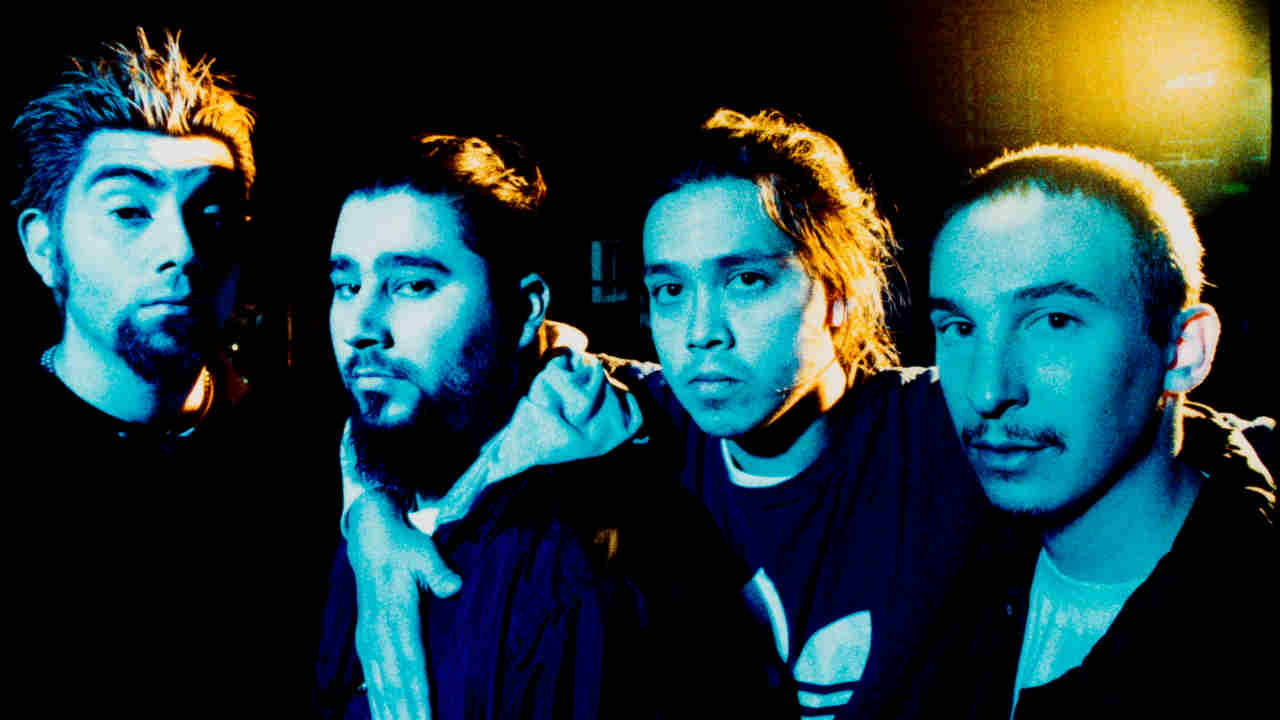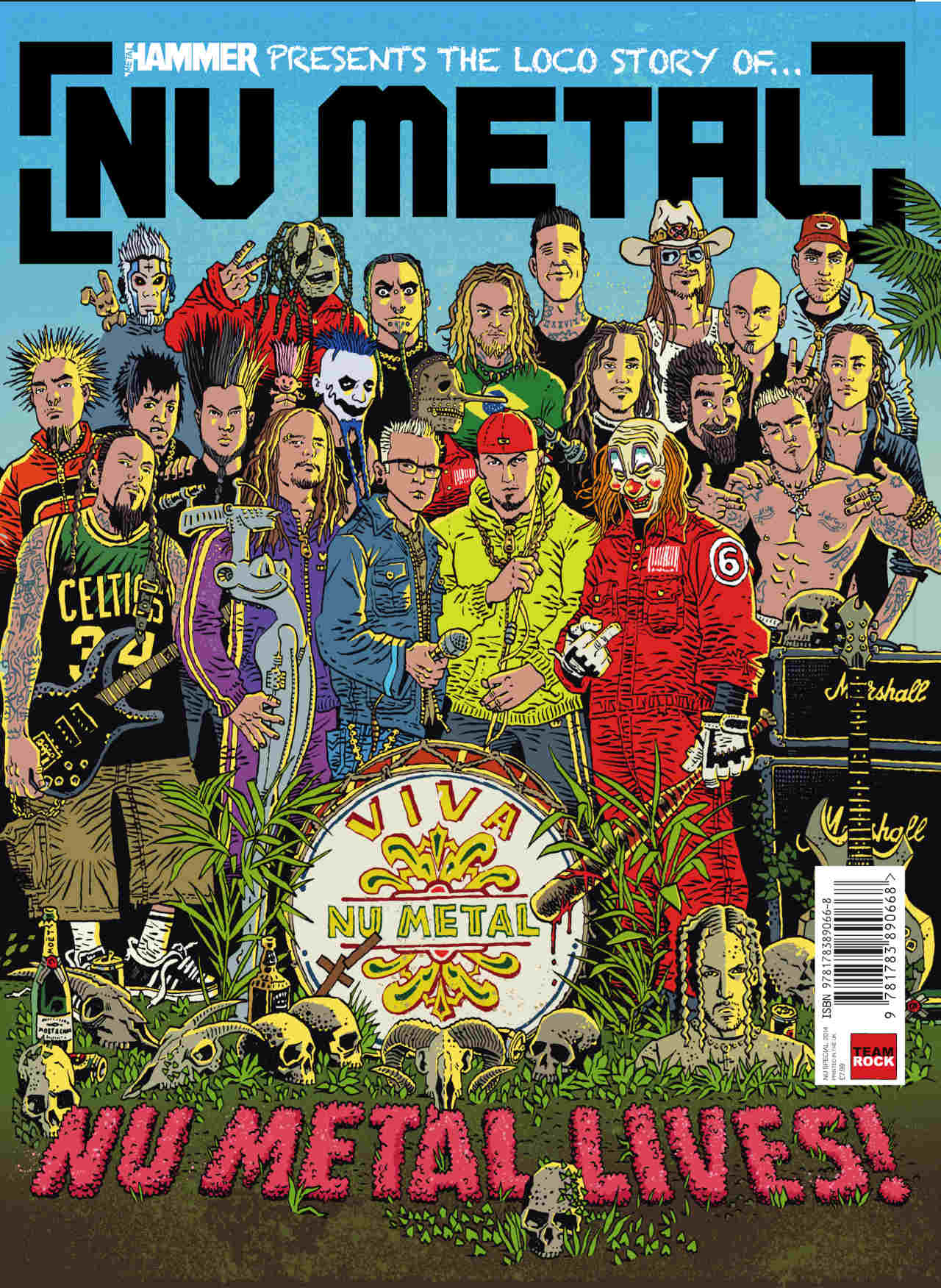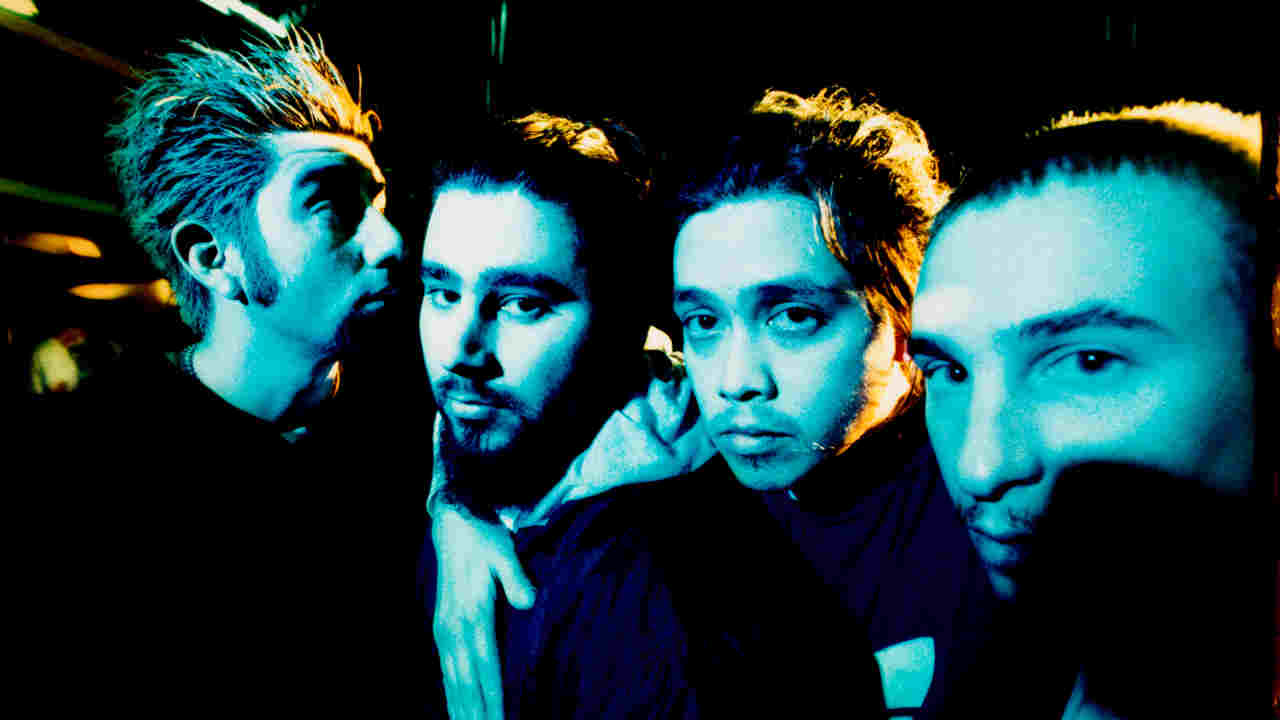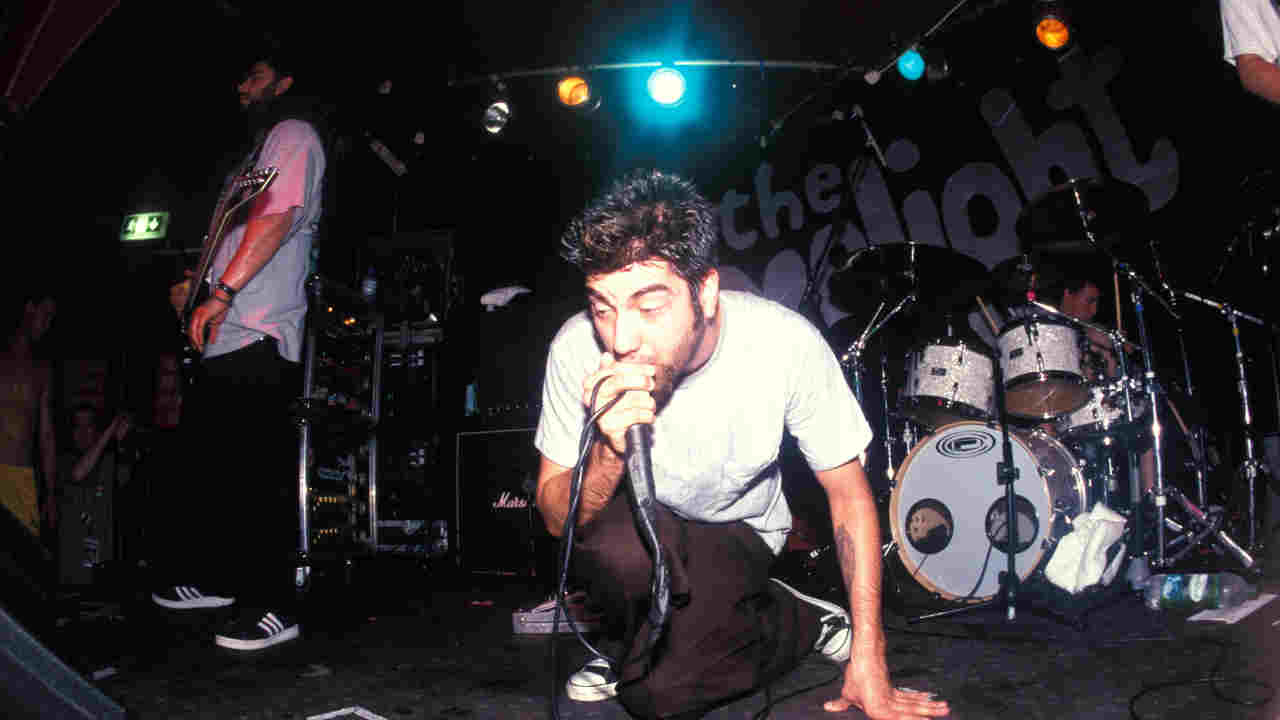“The record label took a million dollars from us. There was nothing we could do because it was our fault”: How Deftones helped create nu metal – then escaped it

Deftones were there at the beginning of nu metal with 1995’s landmark debut album Adrenaline, but by the end of the decade they had left the scene behind. In 2014, singer Chino Moreno and guitarist Stephen Carpenter looked back on the chaos and glory of the band’s early years.

There aren’t many bands in modern rock who’ve gone through as much as Deftones. Through inner-band conflict, substance abuse and the death of bassist Chi Cheng in 2013, , they remain one of the biggest bands within our stratum. They’ve outlasted nu metal, emo, metalcore and screamo (and they’ve been labelled in just about all of them) without ever altering their core sound. Ol’ Blue Eyes says he did it his way, but Deftones are the real deal.
Their seeds were sown in 1988, during seventh grade at a school in Sacramento, California. Abe Cunningham and Chino Moreno were classmates who would sit in lessons and spend their time like most other high-school students: by taking apart a pair of headphones and running one ear up each of their sleeves and playing the then recently released …And Justice For All by Metallica over and over again.
“I knew Abe played drums but there was a song on that record that he said he could play all the way through,” laughs a reminiscing Chino Moreno. “I was like, ‘No you can’t!’ I went to his house and he played the whole song. I had to take him to meet Stephen [Carpenter].”

Hailing from the same modest suburban neighbourhood of Sacramento as Chino, teenage guitarist Stephen had already taught himself how to shred. By this point, he was able to rip on the likes of S.O.D. and Death Angel, and following Chino introducing the pair, the musical chemistry between Abe and Stephen was instantaneous.
“They were locked in straight away. Stephen’s jaw just hit the ground when he heard Abe play,” says Chino. “I saw Abe at school a few weeks later and he said he and Stephen had been jamming for a few weeks and they’d written a few songs and Stephen wanted me to sing.
“I didn’t know anything about heavy metal really, apart from a couple of Metallica records, so I didn’t know how to sing like that,” admits Chino. “I didn’t know how to sing but in junior high school, I used to rap. I loved The Smiths so I’d try to sing like Morrissey, and I’d rap too, so I had no identity at all. All of those things are still in me and that’s made the uniqueness of what I do, I guess.”

With bass player Chi Cheng completing the Deftones lineup, the young band wrote everything from reggae-rap to straight-up, balls-to-the-wall heavy metal in a crusade to cement their sound. Honing their craft locally in Sacramento, they formed their signature sound and hit LA to get themselves a deal, meeting fellow newcomers Korn in the process. After recording a demo with soon-to-be nu metal über‑producer Ross Robinson, Chino says people were already starting to spit jibes at the band and label them ‘baby Korn’.
“We were definitely grouped in with Korn,” says Stephen. “The only similarity was that we both made heavy music and we were both doing something that people considered exciting at the time, but I liked what those guys were doing.”
“We had to take our own road and not attach ourselves to any scene,” agrees Chino. “That’s something that’s always been our thing.”
Recruiting Pantera and Prong producer Terry Date and signing with Madonna’s Maverick label, Deftones recorded and released their debut album, Adrenaline. Alongside Korn and Incubus, Deftones were cited as pioneers of the burgeoning nu metal scene, and riot-starting tracks like 7 Words and Minus Blindfold sound as fresh and club-ready today as they did upon their release back in 1995.
“I’m not sure our mental capacity has ever been forward-thinking,” says Stephen, who laughs and reveals that his downbeat turn of phrase has earned him the nickname Negatron among his bandmates. “We try to do something that sounds good to us and that’s just about it. There’s never a masterplan behind what we do.”
“I couldn’t even say that we put that much thought into that record,” says a modest Chino. “We captured an energy and a youthful spirit that you can still hear and that still shows today, but we were just excited to be recording an album.”
If the band fired early warning shots with their debut release, their sophomore effort, 1998’s Around The Fur, blew the fucking doors off. Maintaining the zip and bounce of their debut on the dancefloor-filling My Own Summer (Shove It), the band also began to extend their journey into the world of atmospherics, with Chino’s otherworldly vocal delivery growing in stature tenfold on an album that’s rightfully regarded as one of the most essential rock records of the 90s.
Deftones – Be Quiet And Drive (Far Away) (Official Video) [HD Remaster] – YouTube ![Deftones - Be Quiet And Drive (Far Away) (Official Video) [HD Remaster] - YouTube](https://img.youtube.com/vi/KvknOXGPzCQ/maxresdefault.jpg)
“It’s funny, people always think it’s me who brought that other side to the band,” Chino shrugs. “It was Stephen who wrote Be Quiet And Drive (Far Away) and started building on our sound in that way, and it just kind of worked for all of us.”
“I wrote Mascara too and that’s pretty mellow, right?” laughs Stephen. “I don’t always write the heaviest music. I write what I feel. I just feel the heavier stuff more often than not because that’s how I am as a guitar player.”
Riding universal acclaim for their bold leap forward on Around The Fur, follow-up White Pony saw the band branching out further than ever before, with Chino adding second guitar to the writing process. However, due to his amateur ability, this also added an age to the band’s recording process.
“It slowed us down incredibly because he didn’t really know how to play guitar,” says Stephen. “That time when he was learning to play guitar was when we went from taking a year or less to make a record to two years or greater.”
“I sucked at guitar,” admits Chino. “I was learning to play and I didn’t really know what I was doing and I still don’t, but Stephen only recently admitted that it made him mad.”
“I still joke around with him about how I wish I could have learnt to play guitar in a band that was signed already,” Stephen says.
Through this sense of frustration, there were allegations within the press that a power struggle was starting to emerge between Chino and Stephen during the album’s creation.
“There wasn’t a power struggle,” says Stephen with point-blank directness.
“People don’t realise that me and Stephen wrote a lot of that record together and we were in the same headspace at the same time,” asserts Chino. “It wasn’t that I took control and mellowed out the band at all. We write well together because we’re both looking to push ourselves. It’s not that we want to outdo each other but we do try to outdo ourselves.”
Through all of the alleged creative control issues and added time to the band’s schedule, Deftones created what is commonly considered their finest hour with White Pony. Fearlessly experimental and a true journey of an album, it’s a record that is rightfully revered as one of the best rock albums of the last decade and the essential purchase for anyone interested in alternative metal.

“Towards the end of the making of that record, we knew we had something special,” admits Chino. “When we were listening to the final mixes, we knew we were doing something that nobody else was doing, that we had pushed ourselves, and I felt great about it.”
White Pony saw Deftones hit new heights. The album landed at Number Three on the Billboard charts and the band’s headline arena shows in the UK included A Perfect Circle and Linkin Park as support acts at Wembley Arena and the now-defunct London Arena in Docklands respectively. They also beat Pantera, Iron Maiden and Slipknot to win Best Metal Performance at the 2001 Grammys.
If it seems alL rags to riches for Deftones’ nu metal years, we’ll leave you with one of the biggest and best untold stories in the genre’s history. While recording White Pony, the band’s label began to start getting impatient as Deftones strived for the perfection that their artistic vision deserved. In point blank fashion, Maverick told the band that if they didn’t deliver the record in time, they would be fined $1,000,000. One. Million. Dollars. Think about what you could do with a million dollars. Wow. So, as the band toiled away on delivering their magnum opus, this deadline came and went. We heard this story and treated it as some sort of urban legend but, just to clear it up, we asked Chino if his band have ever been fined the amount of money that most people could retire on.
“It’s true,” he says, looking at the floor, and we imagine him fantasising about himself throwing stacks of dollars in the air, laughing maniacally. “They just took it from us. There was nothing we could do because it was our fault. I mean, it’s a million dollars and I can’t act like that’s nothing but at least people liked the record and it’s gone down historically the way it has. Can you imagine what a million dollars looks like?”
No, Chino, you maniac. No, we can’t.
Originally published in Metal Hammer Presents The Story Of Nu Metal, January 2014
